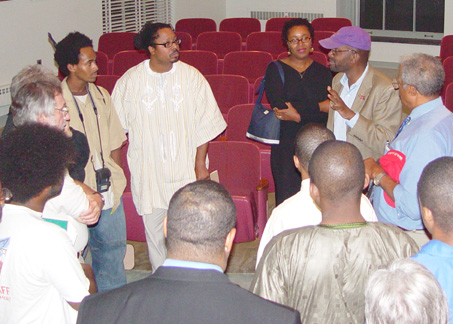 Ted Childs talks with Wabash faculty and students. |
“As a moral argument for hiring women, ethnic minorities, or the gay community or the disabled, the argument of affirmative action has failed. It hasn’t worked,” the 36-year IBM veteran and the company’s vice-president of global workforce diversity told a Wabash College audience. “Those who say you should have affirmative action for moral reasons undermine its intent.
“When I look at diversity, I see it not through the lens of affirmative action, but as a discussion of business,” Childs said. “I believe that affirmative action is a passenger in the car, but the driver is the marketplace.
“When we are guided by the marketplace, we will hire people who are different, promote them, and allow them to achieve,” Childs said. “I believe that no matter who you hate, no matter the depth of your bigotry, you don’t hate anyone more than you love money. And given the opportunity to have me spend my money with you, you will blink, be that because you’re greedy, or simply because you’re a good businessperson.
“Affirmative action cannot be a race and gender discussion; that is limiting and very inappropriately defining,” Childs insisted, keeping the focus on economics. “There are 31 million people in America living below the poverty line, and 14 million of them are white. And I ask the question, ‘What is to become of them?’ My answer is that they must be exposed to the same affirmative action tools that are made available to people who look like me who are poor. Our social and economic strategy must say that we’re not going to leave people behind, and that people who are poor, regardless of their color or gender, have to be able to access the assistance this country is able to provide.
“I have not forgotten that I am black,” Childs said. “But I am also American, and I don’t believe that black people can be strong in a country that succeeds by leaving other people behind.
“Affirmative action, in many minds, implies taking from someone else to give somebody an advantage. I believe affirmative action must be defined as eliminating disadvantage, not giving anyone an advantage.”
Childs cited IBM as an example of diversity being good for business. He recalled the company’s “a heritage of inclusion” and financial success, including an equal opportunity statement established by the IBM president more than 15 years before the Civil Rights Act. He also outlined the company’s efforts to attract and keep top workers by creating a worker-friendly and supportive environment, including helping them to balance work and personal lives.
IBM’s work/life initiative focuses on different cultural expectations, dependent care, and flexibility for caregivers.
“Childcare and dependent care are important to a company—not out of charity, but because it’s a productivity issue,” Childs said. “We have to support the needs of our employees so they can focus on their jobs.”
With companies selling to an increasingly non-white customer base and with the global marketplace requiring large companies to stretch into a wide range of diversity is becoming essential to staying on the cutting edge. Childs has found himself speaking at many corporations and groups outside of IBM, helping others to “define your customers and ensuring that you look like them.
“If people can’t see others like themselves being treated fairly within a company, they should and will take their money somewhere else,” Childs concluded. “This is the business case for diversity.”